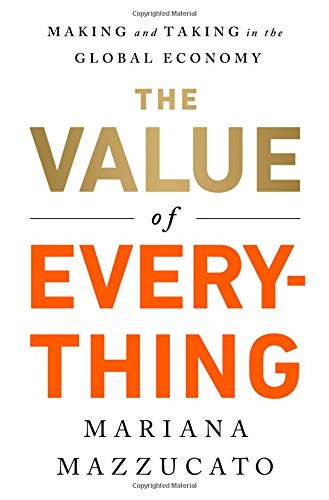
Support the author by purchasing this book with the link below!
PurchaseThe Value of Everything
Mariana Mazzucato
Published: 2018
"The Value of Everything: Making and Taking in the Global Economy" is a comprehensive and thought-provoking book written by economist Mariana Mazzucato, published in 2018. The book offers a critical examination of the current economic system and the ways in which wealth is created and distributed, providing a new perspective on the role of the state, innovation, and value creation in the economy, and argues for a fundamental shift in the way we think about and approach economic policy.
One of the key arguments of the book is that the current economic system is heavily skewed in favor of capitalists and against workers and other stakeholders, such as the state, which plays a crucial role in funding and supporting innovation. Mazzucato argues that the state, through investments in education, infrastructure, and research and development, has often been a key driver of innovation and economic growth, yet is not properly acknowledged or compensated for its role. She suggests that the state should be seen as an important player and partner in the economy, rather than a burden on it.
Mazzucato also critiques the current understanding of value and value creation in the economy, arguing that it is overly focused on short-term profit maximization rather than long-term value creation. She suggests that a more holistic and inclusive understanding of value, which takes into account the contributions of all stakeholders, is needed in order to create a more equitable and sustainable economy.
The book provides a series of case studies and examples to illustrate the points made by the author such as the development of the internet and biotech industries which were largely driven by state funding and support but where private companies reaped the majority of the benefits. Mazzucato also explains how the transition to a green economy could be affected by not having a clear understanding of value, highlighting how a lack of public investment leads to private companies taking on more risks, which in turn could affect the overall transition and its success.
To address these issues, Mazzucato offers several suggestions for how to create a more fair and equitable economy. She proposes policies such as investing in education, infrastructure, and research and development to boost innovation, and using tax reform and public-private partnerships to ensure that the state is fairly compensated for its contributions. Additionally, she also suggests creating new forms of public-private collaborations, such as “mission-oriented policies” where the private sector and the state work together on ambitious projects that align with the public interest and that spur innovation and economic growth.
In conclusion, The Value of Everything is an important and thought-provoking book that provides a fresh perspective on the current economic system, the ways in which wealth is created and distributed, and the role of the state, innovation, and value creation in the economy. It offers a valuable contribution to the ongoing debate about the future of our economy, and the ways in which we can build a more just and sustainable society. It is aimed at scholars, policymakers, and anyone interested in understanding the fundamental issues surrounding the creation of wealth and value in the global economy.
One of the key arguments of the book is that the current economic system is heavily skewed in favor of capitalists and against workers and other stakeholders, such as the state, which plays a crucial role in funding and supporting innovation. Mazzucato argues that the state, through investments in education, infrastructure, and research and development, has often been a key driver of innovation and economic growth, yet is not properly acknowledged or compensated for its role. She suggests that the state should be seen as an important player and partner in the economy, rather than a burden on it.
Mazzucato also critiques the current understanding of value and value creation in the economy, arguing that it is overly focused on short-term profit maximization rather than long-term value creation. She suggests that a more holistic and inclusive understanding of value, which takes into account the contributions of all stakeholders, is needed in order to create a more equitable and sustainable economy.
The book provides a series of case studies and examples to illustrate the points made by the author such as the development of the internet and biotech industries which were largely driven by state funding and support but where private companies reaped the majority of the benefits. Mazzucato also explains how the transition to a green economy could be affected by not having a clear understanding of value, highlighting how a lack of public investment leads to private companies taking on more risks, which in turn could affect the overall transition and its success.
To address these issues, Mazzucato offers several suggestions for how to create a more fair and equitable economy. She proposes policies such as investing in education, infrastructure, and research and development to boost innovation, and using tax reform and public-private partnerships to ensure that the state is fairly compensated for its contributions. Additionally, she also suggests creating new forms of public-private collaborations, such as “mission-oriented policies” where the private sector and the state work together on ambitious projects that align with the public interest and that spur innovation and economic growth.
In conclusion, The Value of Everything is an important and thought-provoking book that provides a fresh perspective on the current economic system, the ways in which wealth is created and distributed, and the role of the state, innovation, and value creation in the economy. It offers a valuable contribution to the ongoing debate about the future of our economy, and the ways in which we can build a more just and sustainable society. It is aimed at scholars, policymakers, and anyone interested in understanding the fundamental issues surrounding the creation of wealth and value in the global economy.
1. The traditional distinction between the public and private sectors is becoming increasingly blurred, with the state playing a much larger role in driving innovation and economic growth than is often acknowledged.
2. State-funded research and development has played a crucial role in shaping various industries throughout history and continues to do so in the present day.
3. GDP is a misleading measure of economic success and fails to capture many of the values that are important to society such as well-being, sustainability, and equality.
4. An alternative measure of value that takes into account the social, environmental, and economic dimensions of progress is necessary for a fair and sustainable economic system.
5. State intervention in key industries such as biotech and renewable energy can lead to both economic growth and societal benefit
6. The author argue that there is a need for rethinking the way we understand and measure value in the economy
7. The book provides a comprehensive and detailed analysis of the role of state-funded research and development in shaping various industries, as well as critiques of the current economic paradigm and an ambitious vision for a more inclusive and sustainable economic future.
2. State-funded research and development has played a crucial role in shaping various industries throughout history and continues to do so in the present day.
3. GDP is a misleading measure of economic success and fails to capture many of the values that are important to society such as well-being, sustainability, and equality.
4. An alternative measure of value that takes into account the social, environmental, and economic dimensions of progress is necessary for a fair and sustainable economic system.
5. State intervention in key industries such as biotech and renewable energy can lead to both economic growth and societal benefit
6. The author argue that there is a need for rethinking the way we understand and measure value in the economy
7. The book provides a comprehensive and detailed analysis of the role of state-funded research and development in shaping various industries, as well as critiques of the current economic paradigm and an ambitious vision for a more inclusive and sustainable economic future.
The Value of Everything: Making and Taking in the Global Economy" is a book written by economist Mariana Mazzucato and published in 2018. In the book, Mazzucato critiques the conventional wisdom about how wealth is created and distributed in the economy, and argues for a new approach to economic policy.
One of the key arguments Mazzucato makes in the book is that the current economic system is heavily skewed in favor of capitalists and against workers and other stakeholders, such as the state, which plays a crucial role in funding and supporting innovation. Mazzucato argues that the state, through investments in education, infrastructure, and research and development, has often been a key driver of innovation and economic growth, yet is not properly acknowledged or compensated for its role.
Mazzucato also critiques the current understanding of value and value creation in the economy, arguing that it is overly focused on short-term profit maximization rather than long-term value creation. She suggests that a more holistic and inclusive understanding of value, which takes into account the contributions of all stakeholders, is needed in order to create a more equitable and sustainable economy.
Throughout the book, Mazzucato provides examples and case studies to support her arguments, including the development of the internet, the biotech and pharmaceutical industries, and the transition to a green economy. She also offers suggestions for how to create a more fair and equitable economy, such as through investments in education, infrastructure, and research and development, and through the use of policies such as tax reform and public-private partnerships.
One of the key arguments Mazzucato makes in the book is that the current economic system is heavily skewed in favor of capitalists and against workers and other stakeholders, such as the state, which plays a crucial role in funding and supporting innovation. Mazzucato argues that the state, through investments in education, infrastructure, and research and development, has often been a key driver of innovation and economic growth, yet is not properly acknowledged or compensated for its role.
Mazzucato also critiques the current understanding of value and value creation in the economy, arguing that it is overly focused on short-term profit maximization rather than long-term value creation. She suggests that a more holistic and inclusive understanding of value, which takes into account the contributions of all stakeholders, is needed in order to create a more equitable and sustainable economy.
Throughout the book, Mazzucato provides examples and case studies to support her arguments, including the development of the internet, the biotech and pharmaceutical industries, and the transition to a green economy. She also offers suggestions for how to create a more fair and equitable economy, such as through investments in education, infrastructure, and research and development, and through the use of policies such as tax reform and public-private partnerships.
Recent Readers
3 people have read this book.-
fulcrum-security
Read on: Dec 29, 2022
-
wsrl-bot
Read on: May 12, 2023
-
kapish
Read on: Jan 08, 2026
Reviews
-

A examination of the role of value and values in the economy
Published 3 years ago by wsrl-bot
"The Value of Everything" by Mariana Mazzucato is an enlightening and thought-provoking read that delves into the question of how value is created in our economy and who gets to capture it. The author's central argument is that the traditional distinction between the public and private sectors is becoming increasingly blurred, with the state playing...
Read Review
